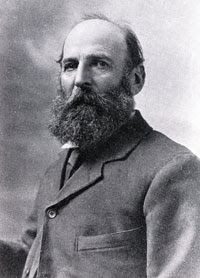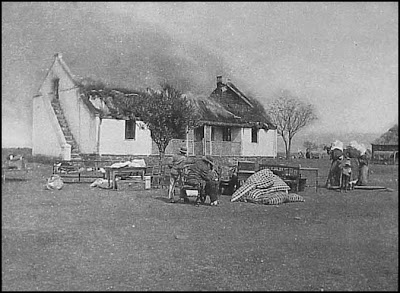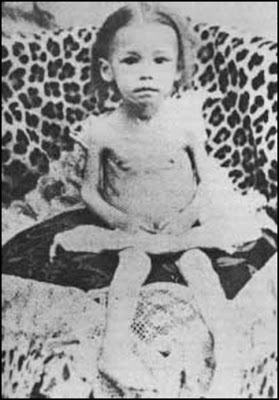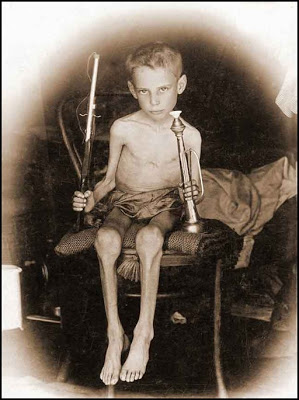
General Jacobus Herculaas de la Rey (22 October 1847 - 15 September 1914), known as Koos de la Rey was a Boer general during the Second Boer War and is widely regarded as being one of the strongest military leaders during that conflict.
He is generally regarded as the bravest of the Boer generals during the Second Boer War and as one of the leading figures of Boer independence. As a guerrilla, his tactics proved extremely successful. De la Rey opposed the war until the last, but when he was once accused of cowardice during a Volksraad session, he replied that if the time for war came, he would be fighting long after all those clamoring for war had given up. This proved to be the case. . .
(After the main Boer armies had been smashed by the numerically superior British forces,) only a hard core of Boers were willing to remain in the field. De la Rey, Louis Botha and other commanders met near Kroonstad and laid down a new strategy of guerrilla war. The Western Transvaal fell to De la Rey, and for the next two years he led a mobile campaign, winning battles at Moedwil, Nooitgedacht, Driefontein, Donkerhoek and other places, and inflicting large losses of men and material on the British at Ysterspruit on 25 February 1902, where enough ammunition and supplies were captured to reinvigorate the Boer forces. At Tweebosch on 7 March 1902, a large part of Methuen's rear-guard was captured, including Methuen himself. Albeit ragged and often hungry, his men roamed at will over vast areas and tied down tens of thousands of British troops. De la Rey had an uncanny knack for avoiding ambush . . . Despite some reverses, such as the Battle of Rooiwal in April 1902, De la Rey's commandos, numbering up to 3,000 men, remained in the field until the end of the war.Boer Commandos.
De la Rey was noted for chivalrous behaviour towards his enemies. For example, at Tweebosch on 7 March 1902 he captured Lieutenant General Methuen along with several hundred of his troops. The troops were sent back to their lines because De La Rey had no means to support them, and Methuen was also released because he had been gravely wounded and De la Rey believed that he would die without the prompt medical attention which only the British could provide.-- Wikipedia
 "Besides torching their homesteads and all their belongings, and imprisoning the women and children in concentration camps, the British also torched many Boer towns -- and importantly, also destroyed the libraries of the Boer Republics – thus removing all their own cultural life. In modern-day terminology, this would have been referred to as ethnic-cleansing… The British then forced the Boers into a huge programme of Anglicisation, by sending Scottish Protestant ministers to preach in their protestant churches and denying Boer children any rights to an education in their own Afrikaans language…. However this plan misfired: the Scottish ministers such as the Murrays and many others, married Boer girls and became Afrikaners…"
"Besides torching their homesteads and all their belongings, and imprisoning the women and children in concentration camps, the British also torched many Boer towns -- and importantly, also destroyed the libraries of the Boer Republics – thus removing all their own cultural life. In modern-day terminology, this would have been referred to as ethnic-cleansing… The British then forced the Boers into a huge programme of Anglicisation, by sending Scottish Protestant ministers to preach in their protestant churches and denying Boer children any rights to an education in their own Afrikaans language…. However this plan misfired: the Scottish ministers such as the Murrays and many others, married Boer girls and became Afrikaners…"To counter the guerrilla campaign the British under first Roberts and then Kitchener adopted a scorched earth counter-insurgency tactic. This involved sweeping the country bare of everything that could give sustenance to the Boer guerrillas, including women and children, and included the destruction of crops, burning down homesteads and farms, poisoning wells, and salting fields, and saw non-combatants (Boer families and sympathisers) interned in concentration camps where mortality among the women and children was so high that 50% of the population of Boer children under 16 died. The will of the Boer fighters still in the field was slowly eroded by such attritional tactics and ultimately they realised that the costs exceeded the cause; there would soon be little left for them to fight for. Many tens of thousands of blacks were interned by the British in appalling conditions in the concentration camps as well, while on the other hand others were suspected by the Boers of sympathising with the British, and betraying the whereabouts of guerillas, leading to harsh reprisals.
 Boer children after a few months in British concentration camps.
Boer children after a few months in British concentration camps.
The British offered terms of peace on various occasions, notably in March 1901, but were rejected by Botha. Lord Kitchener requested that De la Rey meet with him at Klerksdorp on 11 March 1902 for a parley. The two enemies formed a bond of friendship which gave De la Rey confidence in the sincerity of the British proposals. Diplomatic efforts to find a way out of the conflict continued and eventually led to an agreement to hold peace talks at Vereeniging, in which De la Rey took part and urged peace. The Treaty of Vereeniging was signed on 31 May 1902. He and General Botha visited England and the United States later in the same year.[1] The Boers were promised eventual self-government (granted in 1906 and 1907 for the Transvaal and Orange Free State respectively) and awarded £3,000,000 compensation, while acknowledging the sovereignty of Edward VII.
After the war De la Rey travelled to Europe with Louis Botha and Christiaan de Wet to raise funds for the impoverished Boers whose families and farms had been devastated. In 1903 he was in India and Ceylon, persuading the prisoners of war interned there to take the oath of allegiance and return to South Africa. Finally he returned to his own farm with his wife and remaining children. Jacoba had spent most of the war trekking in the veld with her children and a few faithful servants; she subsequently wrote a book about her wanderings, Myne Omzwervingen en Beproevingen Gedurende den Oorlog (1903), which was translated into English. . .
With the outbreak of the First World War, a crisis ensued when Louis Botha agreed to send troops to take over the German colony of South West Africa (now Namibia). Many Boers were opposed to fighting for Britain and against Germany. Also, many were of German descent and Germany had been sympathetic to their struggle so they looked to De la Rey for leadership. In Parliament he advocated neutrality and stated that he was utterly opposed to war unless South Africa was attacked. Nevertheless he was persuaded by Botha and Jan Smuts not to take any actions which might arouse the Boers. De la Rey appears to have been torn between loyalty to his comrades-in-arms, most of whom had joined the Hertzog faction, and his sense of honour.
Siener van Rensburg attracted large crowds with accounts of his visions in which he saw the whole world consumed by war and the end of the British Empire. On 2 August he told of a dream in which he saw General De la Rey returning home bare-headed in a carriage adorned with flowers, while a black cloud with the number 15 on it poured down blood. The excited Boers took this as a sign that De la Rey would be triumphant, but van Rensburg himself believed the dream warned of death.
On 15 September 1914 an old comrade General C.F. Beyers, Commandant-General of the armed forces, resigned his commission and sent his car to fetch De la Rey from Johannesburg to Pretoria as he wished to consult with him. The two generals then set out that evening for Potchefstroom military camp where General JCG Kemp had also resigned. They encountered several police roadblocks but refused to stop, although they had in fact been set to capture the Foster gang. At Langlaagte the police fired on the speeding car and a bullet struck De la Rey's back, ending his life; his last words were dit is raak ('It hit'). He returned to his Lichtenburg farm as van Rensburg had predicted. Many Boers were convinced he had been deliberately assassinated, while others could not believe that he would have joined a rebellion, breaking his oath. According to Beyers the plan was to co-ordinate the simultaneous resignation of all the senior officers in protest at the attack on South West Africa. The theory of a government assassination holds sway to this day. -- Wikipedia.
Michael Collins studied the guerrilla campaigns of De La Rey and Christiaan De Wet and used them as a template for his "flying columns."
And I told you all of that as background for this song, "De La Rey.
Go, listen and ponder.
Mike
III
9 comments:
The song, beautiful.
"This is like deja vu all over again."
~Yogi Berra
http://www.youtube.com/watch?v=tJrGfTQH5HY&feature=related
I found the above video to be just as good and appropriate.
Mike -
When we first met online, before in person, I think I mentioned to you that my dear Mother's ancestors were all Celts, from their earliest times until her parents and aunt and uncle came here. You may remember me asking if you were of Boer / Afrikaner ancestry due to the Dutch blood and the name. And I MAY have mentioned my father's ancestry of English, German and NA.
On either side of my family, there have been people who fought in wars where the cost was unimaginable yet they fought regardless. I was told once that some people thought my father's ancestor a traitor because of his fighting with Boers against his countrymen. But his disgust with any ideas of English 'civility' was overwhelming when he saw the pictures of the Boer women and children being tortured and starved and beaten by the 'civilized' Brits... for the crime of being married to, or fathered by, a free man; and killing a man's family as a way of breaking his spirit - can anyone say that this is even human behavior at its least civil?
May I humbly suggest, if you haven't already done so, that you see some of the other versions of such standards as 'Afrikanerhart' and realize that these men - like the Irish of the earlier days - they are brothers, they are family to us in spirit.
Sorry, not quite sure what I am trying to say. But some things leave a tear in my eye. and one is the knowing that some of my own people have fought and died for the cause of freedom when they were outnumbered by incomprehensible odds.
May their courage be with each of us today.
Those photos of the children, and also the photos of Nanking...
I look at them to remind me of one truth that I will always hold for myself...
I will always strive against evil men, until they are dead, or I am.
The Gray Ghost and other Partisan Rangers during the confederate war for independence operated on similar lines.
I am part of the proud Boer nation . . . . . now a US patriot supporter.
Legal Alien
I am trying to find my own selve. My "inner-selve". Now a white man of 40 years old, dreaming visions of cyberspace in 2025, i understand this struggle of the boers in SA. I grew up in a farm-community in Belgium and i miss things in 2012. A lot of things have changed. I life in issolation. I watch 80s TV-series, and listen to music of the 80s. Why ? I dont know. anyhow, i learned, that no nation on earth is innocent. All nations have blood on their hands. yep. No only the British against the Afrikaners, but also the Dutch against the people of Indonesia, The French against Marocco/Algeria, etc. It would be good to learn and understand other cultures in our world. Planet earth is vurnable, and only little. It would be best to create a society, where there is no war. I understand this is just a dream. But I like my dreams.... A world without Racism, war, where everybody is happy.
Yours Sincerely,
Richard J Vermeulen, Holland, ,may 2012.
my parents great grandparents dies in a british concentration camp. but, still I can care less that all those little stupid people died. They shouldve protected themselves.
Post a Comment